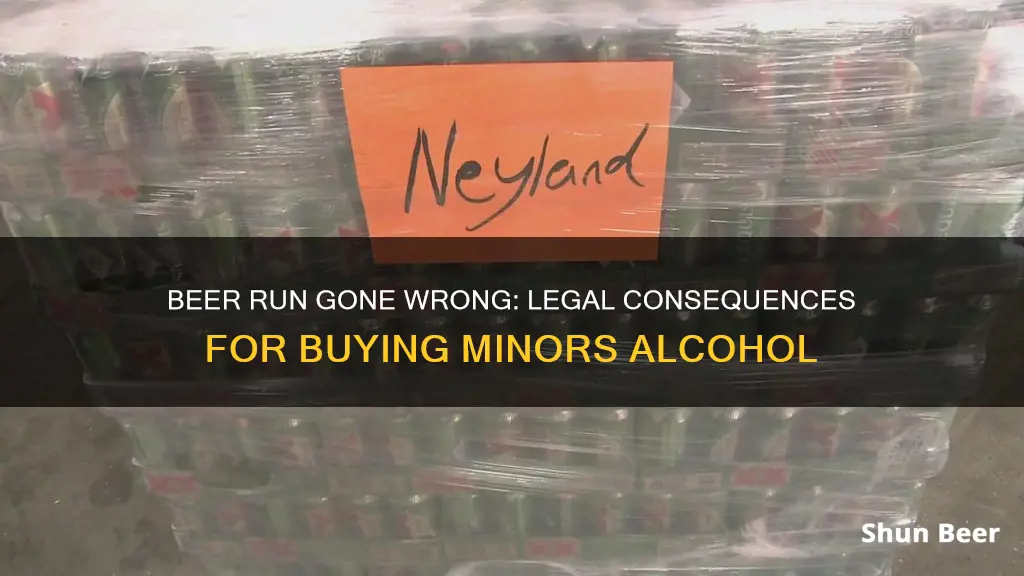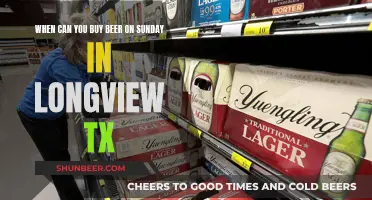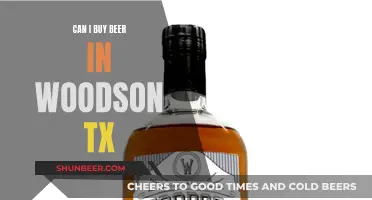
Buying alcohol for minors is illegal in the United States, and the consequences can be severe. The legal drinking age in the US is 21, and anyone who supplies alcohol to a minor is committing a crime, regardless of whether money is exchanged. State laws differ, but penalties can include fines, community service, and even jail time. In addition to criminal penalties, those caught buying alcohol for minors may face disciplinary action from their school or university. It is important to be aware of the legal consequences and to seek legal advice if accused of purchasing alcohol for minors.
| Characteristics | Values |
|---|---|
| Legal drinking age in the US | 21 years old |
| Minors buying alcohol | A crime in most states |
| Minors attempting to buy alcohol | A crime in most states |
| Minors in possession of alcohol | A crime in most states |
| Minors consuming alcohol | A crime in most states |
| Adults supplying alcohol to minors | A crime in most states |
| Exceptions | Some states allow parents, guardians, or spouses to supply alcohol to minors |
| Penalties for supplying alcohol to minors | Misdemeanor or felony charges, fines, jail time, license suspension or revocation |
| Penalties for minors buying alcohol | Fines, alcohol awareness programs, community service, suspension of driver's license |
What You'll Learn
- Buying beer for minors is a crime in all states
- The term minor typically refers to anyone younger than 18, but for liquor laws, minors are those under 21
- Buying non-alcoholic beer for minors is illegal in 15 US states
- In some states, buying alcohol for minors is a strict liability offence
- Parents or legal guardians may be exempt from consequences in some states

Buying beer for minors is a crime in all states
In the United States, the legal drinking age is 21 years old. Buying beer for minors is a crime in all states, and anyone who does so commits a crime regardless of the state, though state laws differ in their details. All states have provisions that prohibit supplying alcohol to underage individuals, and these laws apply to everyone, not just businesses that sell alcohol.
The term "minor" typically refers to anyone younger than 18, but for liquor laws, minors are those under the legal drinking age of 21. In most states, even allowing a minor to be in a home where alcohol is available and not blocking access to it is defined as supplying alcohol to a minor. This means that adults don't have to be on the premises or physically give the alcohol to a minor to be charged. Buying alcohol and placing it in a minor's vehicle is also considered supplying alcohol to a minor.
The laws are not enforced in situations where the person did not know that alcohol was available to minors. For example, a property owner who allows a party on their property, knowing that underage individuals will be present, would most likely not be charged with providing alcohol to minors if alcohol was served, though this depends on the specific case.
Some states have exceptions that allow underage individuals to procure or use alcohol. For instance, in some states, parents or legal guardians can provide alcohol to minors in a home environment as long as the parent or guardian is present. Similar exceptions are made for alcohol used in religious ceremonies or for medicinal purposes.
The penalties for selling or supplying alcohol to minors vary by state but can include fines, jail time, probation, community service, and license suspension or revocation for businesses.
Buying Beer in Valdosta, GA: Sunday Laws Explained
You may want to see also

The term minor typically refers to anyone younger than 18, but for liquor laws, minors are those under 21
The definition of a minor varies across different jurisdictions and areas of law. In law, a minor is generally defined as someone under the age of majority, which demarcates an underage individual from legal adulthood. While the age of majority is typically 18, it can vary depending on the specific jurisdiction and the context in which the term is being used.
In the context of liquor laws, the term "minor" often refers to individuals under the age of 21. This is because the legal drinking age in the United States is 21, and individuals below this age are considered minors for the purposes of alcohol-related laws, even if they are at least 18. This distinction is important because it helps to dissuade underage individuals from purchasing or consuming alcohol.
The legal consequences of providing minors with alcohol can vary depending on the specific jurisdiction. In Texas, for example, minors who purchase, attempt to purchase, possess, or consume alcoholic beverages can face Class C misdemeanor charges. Additionally, the vendor who sells alcohol to a minor can be subject to fines and other penalties.
It's worth noting that the definition of a minor is not sharply defined in most jurisdictions, and the age thresholds for various legal rights and responsibilities can vary. For example, the age of criminal responsibility, the age at which school attendance is no longer compulsory, and the age at which individuals can enter into legally binding contracts may differ from one another and from the age of majority.
Buying Beer in Casablanca, Morocco: What You Need to Know
You may want to see also

Buying non-alcoholic beer for minors is illegal in 15 US states
In the United States, the legal drinking age is 21. However, there are varying laws across different states regarding the purchase of non-alcoholic beer by minors. While some states permit minors to buy non-alcoholic beverages, others maintain that only those of legal drinking age can purchase them.
Non-alcoholic beer typically contains less than 0.5% ABV, which is not enough to cause intoxication, even in large quantities. Despite this, some US states classify these beverages as restricted for minors. This means that in 15 states, it is illegal for minors to purchase non-alcoholic beer.
The laws surrounding the sale of non-alcoholic beer to minors are enforced by retailers, who often request ID during the transaction. However, there is no standardised policy, and some retailers may be more lenient than others. In some states, the responsibility falls on the minor to prove they are of legal drinking age, rather than the retailer to verify.
The consequences of supplying alcohol to minors can be severe, and anyone who does so is committing a crime, unless specific exceptions apply. These exceptions include situations where alcohol is provided within a home environment or for medicinal purposes, and the minor must be in the presence of an adult, guardian, or spouse who is over the age of 21 and has given them permission.
Florida's Non-Alcoholic Beer Laws for Minors Explained
You may want to see also

In some states, buying alcohol for minors is a strict liability offence
In the United States, the legal drinking age is 21 years old. While there are some exceptions in certain states that allow parents, guardians, or spouses to offer or supply alcohol to minors, it is generally a crime to supply an underage person with alcohol. All states have provisions that prohibit supplying alcohol to minors, and anyone who does so is committing a criminal offence.
Similarly, in Texas, it is a crime for minors to purchase, attempt to purchase, possess, or consume alcoholic beverages. This is known as a Class C misdemeanour. The law also applies to vendors, who can be punished for selling alcohol to minors, even if they do not ask for identification.
The penalties for supplying alcohol to minors can vary depending on the state and the circumstances. In most cases, it is considered a misdemeanour offence, but it can be upgraded to a felony if there is an accident, injury, or repeated offence involved. Individuals convicted of supplying alcohol to minors may face jail time, fines, probation, and community service. Businesses that are caught selling to minors may also face administrative actions, including fines, license suspension, or license revocation.
Five Beers on Princess: Worth the Money?
You may want to see also

Parents or legal guardians may be exempt from consequences in some states
In the United States, the legal drinking age is 21 years old. While all states prohibit providing alcohol to persons under 21, there are limited exceptions in some states that allow parents, guardians, or spouses to offer or supply alcohol to minors. These exceptions often apply to specific locations, such as private residences or the parent/guardian's home.
The specific laws and punishments for adults convicted of providing alcohol to minors vary from state to state. For example, in North Carolina, a person convicted of providing alcohol to a minor must pay a fine, court costs, and perform community service. In addition, they may be restricted from working for a business that holds an ABC permit for a period of two years following the conviction.
It is important to note that these exceptions do not permit anyone other than a family member to provide alcohol to a minor on private property. The laws also apply to everyone, whether they are licensed to sell alcohol or not.
While there may be limited exceptions, it is generally illegal and can result in serious legal consequences for adults to provide alcohol to minors. Parents and other adults should be aware of the potential risks and consequences of underage drinking and maintain a zero-tolerance policy to keep their children healthy and safe.
Spotted Cow Beer: Where to Buy and Enjoy It
You may want to see also
Frequently asked questions
The legal drinking age in the United States is 21 years old.
Buying alcohol for a minor is a crime in the United States. The consequences for providing alcohol to a minor vary depending on the state and the circumstances but can include fines, jail time, and loss of a liquor license.
In some states, parents or legal guardians are allowed to provide alcohol to minors in a home environment, as long as the parent or guardian is present. Similar exceptions are made for alcohol used in religious ceremonies or for medicinal purposes.







